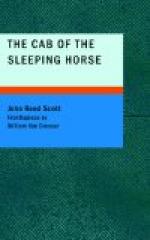He was still ringing when a dishevelled figure, in blue pajamas and a scowl, opened the door.
“What the devil do you—” the disturbed one growled.
“S-h-h!” said Harleston, his finger on his lips. “Keep these for me until tomorrow, Stuart.”
And crowding the roses and the envelope in the astonished man’s hands, he hurried away.
The pajamaed one glared at the flowers and the envelope; then he turned and flung them into a corner of the living-room.
“Hell!” he said in disgust. “Harleston’s either crazy or in love: it’s the same thing anyway.”
He slammed the door and went back to bed.
Harleston, chuckling, returned to his quarters; retrieved from the floor a leaf and a petal and tossed them out of the window. Then, being assured by a careful inspection of the room that there were no further traces of the roses remaining, he went to bed.
Two minutes after his head touched the pillow, he was asleep.
Presently he awoke—listening!
Some one was on the fire-escape. The passage leading to it was just at the end of his suite; more than that, one could climb over the railing, and, by a little care, reach the sill of his bedroom window. This sill was wide and offered an easy footing. If the window were up, one could easily step inside; or, even if it were not, the catch could be slipped in a moment.
Harleston’s window, however, was up—invitingly up; also the window on the passage; it was a warm night and any air was grateful.
He lay quite still and waited developments. They came from another quarter: the corridor on which his apartment opened. Someone was there.
Then the knob of his door turned; he could not distinguish it in the uncertain light, yet he knew it was turning by a peculiarly faint screech—almost so faint as to be indistinguishable. One would not notice it except at the dead of night.
The door hung a moment; then cautiously it swung back a little way, and two men entered. The moon, though now low, was sufficient to light the place faintly and to enable them to see and be seen.
For a brief interval they stood motionless. They came to life when Harleston, reaching up, pushed the electric button.
“What can I do for you, gentlemen?” he asked, blinking into their levelled revolvers.
They were medium-sized men and wore evening clothes; one was about forty-five and rather inclined to stoutness, the other was under forty and rather slender. They were not masked, and their faces, which were strange to Harleston, were the faces of men of breeding, accustomed to affairs.
“You startled us, Mr. Harleston,” the elder replied; “and you blinded us momentarily by the rush of light.”
“It was thoughtless of me,” Harleston returned. He waved his hand toward the chairs. “Won’t you be seated, messieurs—and pardon my not arising; I’m hardly in receiving costume. May I ask whom I am entertaining.”




